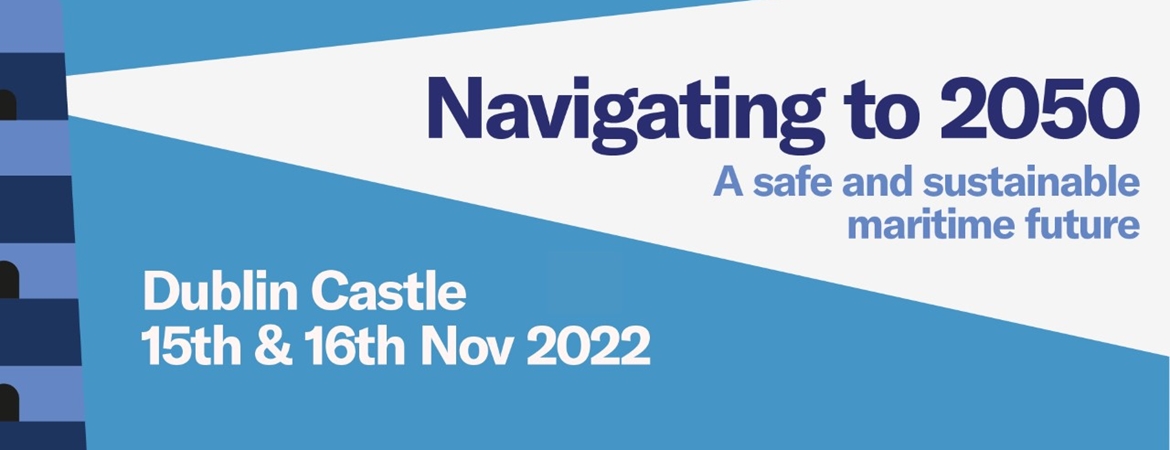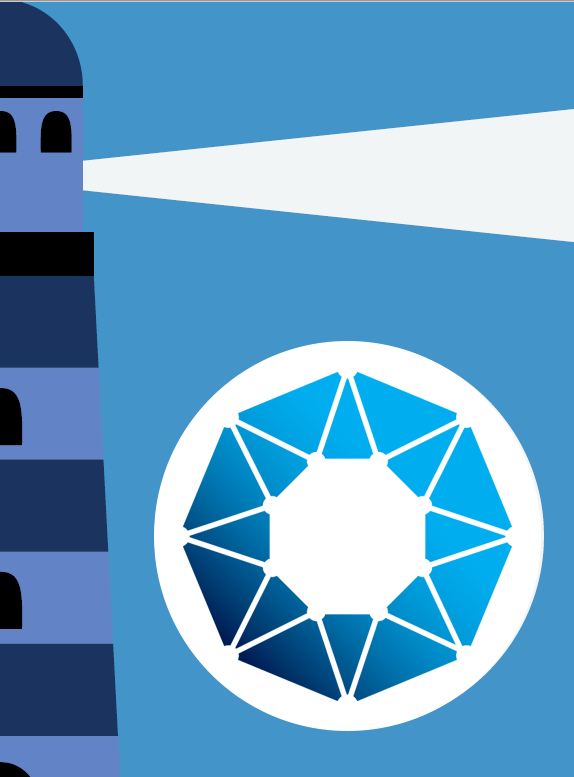Safety and sustainability are central to the maritime sector in Ireland and internationally. That’s according to CEO Yvonne Shields O’Connor who says Irish Lights is delighted with the attendance and engagement at its ‘Navigating to 2050 – A safe and sustainable maritime future’ event in Dublin Castle in November 2022.
“We had over 300 participants, most of whom attended in person, and 34 speakers and panellists from Ireland, Europe, Asia and North America. Our speakers represented an impressive range of expertise in the public and private sectors of the marine world from innovative shipping and tech companies to European and International regulatory and representative bodies.”
“Bringing these leading experts into the one room created a platform for concrete and constructive engagement on major maritime safety and sustainability issues. These included securing supply chains, use of alternative fuels in shipping, safe planning for wind farms, port infrastructure and development, autonomous vessels, digitalisation and education and skills to meet the needs of the future.”
The conference was officially opened by Minister of State at the Department of Transport, Hildegarde Naughton TD. She said the conference went “to the heart of the challenges and the opportunities facing the Maritime sector and indeed the wider economy in the medium term.”
Minister Naughton also referenced the role that the Commissioners of Irish Lights, along with its sister organisations Trinity House and Northern Lighthouse Board, play in the important work of the International Association of Lighthouses and Marine Aids to Navigation or IALA. Minister Naughton announced, in the presence of the Association’s Secretary General, Francis Zachariae, that she had brought a memorandum to Government (9th November, 2022) with a view to the ratification of the IALA Convention in early 2023. The new Intergovernmental Organization which will result in the coming into force of this Convention will be well-placed to maintain and improve global navigation standards.
“Maritime safety is, and will always remain, our chief concern”, Minister Naughton concluded.
Speakers addressed the wider economic implications of the decarbonisation agenda. In particular, the conference gained an early insight into major research on how the shift to more expensive low carbon fuels will impact shipping and the Irish economy. The research, funded by the Marine Institute, is being conducted by Profession Alan Ahearne and Dr Daniel Cassidy at the University of Galway.
Professor Ahearne told conference participants that over 90% of goods (by volume) come into Ireland by sea, so as an island, we are very dependent on marine transport. He said the switch from fossil fuels would not have any major effect until 2050, and by then it will reduce gross value added (GVA) economic productivity by almost 8pc. He said EU regulations on low carbon fuel use by ships will have a “moderate” but not “dramatic” effect on the Irish economy.
Paul Little, CEO, City of Glasgow College and Chair of UK Shipping Skills Taskforce opened the conference by speaking of the importance of skills and education in the maritime sector, a theme that was echoed throughout the two days. He spoke to his experience managing a world leading tertiary institution especially in maritime and innovation. With 2000 courses, supporting 230 industries and 40,000 students drawn from 149 nationalities he had plenty of insights to offer on this topic.
Keynote speaker Anthony Gurnee, Founder and CEO of Ardmore Shipping, Ireland spoke about how transitioning to a sustainable and profitable decarbonised shipping future was moving in a positive direction, albeit slowly. He said "Looking at shipping alone, there is probably the bones of $2 trillion needed to be spent to decarbonise the world shipping fleet, and the scope of change is unprecedented in history, even larger and faster than the transition from sail to steam. Arguably we are not yet sufficiently focused on the safety aspects of the energy transition, or indeed the broader technological revolution already underway in terms of automation and digitalisation”. The positives cited by Mr Gurnee were “we mostly know what to do in terms of ship designs, the technology largely exists and this does not call for radical departures and new technologies will only improve efficiency further.”
Caoimhín Ó Ciaruáin, Assistant Secretary at the Department of Transport said maritime transition to carbon neutrality offered opportunities as well as challenges for Ireland, particularly in Offshore Renewable Energy. Aoife O’Leary, CEO of UK environmental charity, Opportunity Green, said shipping and ports will face costs for failing to act on climate change but agreed that there were opportunities to be seized too.
International Maritime Advisor Dr. Kirsi Tikka, said investment in alternative fuels is required to identify the zero carbon fuels shipping needs to achieve carbon neutrality. Ann Pletschke, Chief Vessel Operator of Ocean Infinity, said autonomous vessels can offer new, safer and more flexible ways of working for mariners and reduce the carbon impact of shipping.
Other highlights of the conference included discussion and debate around the need for consultation and planning on ORE developments, particularly in the busy Irish Sea shipping and fishing areas. Dutch expert, Carien Droppers, said their experience in the North Sea showed the priority was to avoid navigational hazards. She concluded that all parties should be consulted, including shipping and fishing interests, in the planning of offshore wind farms.
Maja Markovčić Kostelac, European Maritime Safety Agency, an organisation with considerable technical capacity and influence in member states commented that with over €3b worth of goods coming through European ports annually, safety & sustainability are key in ensuring the resilience of future shipping. She also talked about how shipping is looking to alternative fuels to reach carbon neutrality targets.
Space services and data for maritime safety was the topic covered by Carmen Aguilera, EUSPA (European Union Agency for Space Programme) who spoke on the topic of assessing the needs of sea, air and land users to improve the services offered by satellites.
The topic of offshore wind developments and safe navigation and the experience of the UK General Lighthouse Authorities was discussed by Nigel Hare, Director of Navigational Requirements, Trinity House, UK. He outlined the General Lighthouse Authorities ((GLAs), which comprises Irish Lights, Trinity House and Northern Lighthouse Board as the primary agencies responsible for marine aids to navigation in the UK and Ireland), responsibilities as consultees on Aids to Navigation matters in respect of marine activities where a marine licence is required. He spoke of how this responsibility places GLAs in the middle of an interesting dichotomy. Mr Hare said, “While the GLAs focus is keeping vessels in our waters safe from navigational hazards, we are also very aware of our role in our respective nation’s prosperity and security. This means the safety of shipping and supporting in turn other maritime activity, whether it’s commercial or leisure and taking account of the need for sustainable energy and the protection of the environment when it comes to discharging statutory responsibilities to ensure offshore windfarms are marked effectively”.
“The conference created a platform for discussion, debate and innovative thinking in the maritime sector,” said Yvonne Shields O’Connor. “It shed light but also pointed to positive paths for addressing the challenges we face in meeting marine safety and sustainability targets. I would like to thank the Irish Lights team for their incredible hard work in pulling it together and also the many speakers and participants who contributed to its success.”
Speaker presentations from the conference are available below.
Highlights of ‘Navigating to 2050 – a safe and sustainable maritime future’
Session 1 : Keynote presenter on the opening session of the conference on Tuesday 15th November, was Anthony Gurnee, Founder and CEO of Ardmore Shipping - an Irish company operating a fleet of modern tankers worldwide. He talked about transitioning to a profitable and decarbonised shipping future. This session heard from Maja Markovčić Kostelac, Executive Director of European Maritime Safety Agency, an organisation with considerable technical capacity and influence in member states. Chris Waddington, Technical Director, International Chamber of Shipping spoke about short term measures that the shipping industry must implement from 2023 onwards. Prof Alan Ahearne from University of Galway gave an insight into the implications of the EU ‘Fit for 55’ Package on the maritime sector and wider Irish economy. Caoimhín Ó Ciaruáin, Department of Transport, talked about the governments’ Climate Action Plan and the implications for the maritime transport sector.
Session 2: The conference looked at new technology and digitalisation and how this will impact on safe navigation and offshore developments. Ronan Boyle, Director of eNavigation and Maritime Services in Irish Lights led a discussion with Chief Vessel Operator of Ocean Infinity Ann Pletschke about the new fleet of autonomous vessels her company is building.
Delegates heard from Jacob Terling of DG Move about the latest thinking on a regulatory framework for autonomous vessels. Niels Peter Fredslund from the Danish Maritime Authority provided an insight on future Aids to Navigation.
Session 3: The opening session focused on offshore wind development and the safety implications for all maritime users. Martina Hennessy from Department of the Environment, Climate and Communications discussed the government’s approach to offshore wind development, post 2030.
Carien Droppers, specialist shipping advisor from the Netherlands talked about the policy approach that has been taken to safety issues in the North Sea and Kai Truempler, Head of Spatial Planning provided insights from Germany. Adam Cronin from DP Energy gave a developer perspective on safety in offshore wind installations.
Session 4: This session focused on ports and regional infrastructure. It explored what developments and investments must be made to facilitate offshore wind development. It also addressed the transition of the maritime sector and wider economy to a sustainable future. Delegates heard from two major ports, Pat Keating of Shannon – Foynes and Mike Robinson of Belfast, about their role in supporting a carbon neutral economy by 2025.
The conference heard from Prof Kurt Bodewig, Co-ordinator of the EU Motorways of the Sea programme about how the EU can support this transition. Catherine Sheridan of EIH2 talked about Green Hydrogen and John O’Sullivan of dCarbonX talked about the need for large-scale sub-surface offshore hydrogen energy storage.
Full programme at: https://www.navigatingto2050.ie/
Speaker presentations below:



